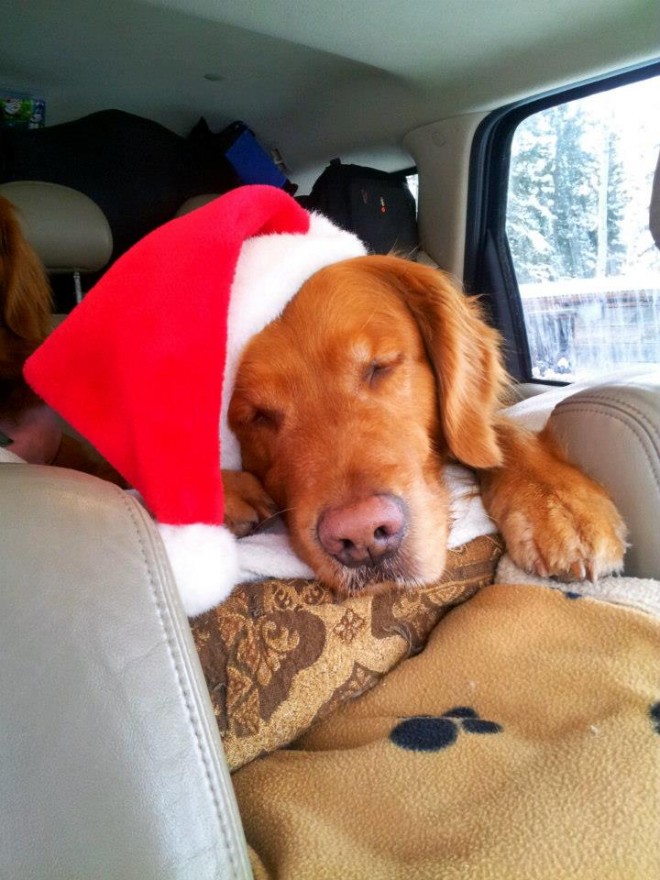‘Tis the season for holiday and winter safety tips. The holidays are an exciting time for us all, including our pets. With the change of decoration and weather, there are some potential hazards that we think all pet parents should be aware of this season!
INDOOR HAZARDS
No Bones Please: Please do not share your turkey bones with your pets! Cooked poultry bones can splinter and easily cause serious injuries. These bone fragments can also cause intestinal blockages and perforations.
Human Food: Chocolate and other sweets should not be given to animals. Chocolate contains theobromine, a chemical that can be deadly to cats and dogs. The darker the chocolate, the worse it is for your pet. Dark chocolate and Baker’s chocolate can be fatal even in small amounts. The best thing you can do for your pets over the holidays is to keep them on their regular diet. Look for special animal treats instead of giving your animals too much human food. If you suspect your pet has ingested chocolate, call your veterinarian right away!
Poisonous Plants: Be aware of seasonal plants that are poisonous to your pets! These include: mistletoe, holly, ornamental pepper and Christmas rose. Poinsettias are not lethal to pets. This has been a long-standing rumour perpetuated for decades. Having said this, some pets may be sensitive to the latex contained in the plant, and may get diarrhea or even vomit if they consume a poinsettia.
Decoration Dangers: Avoid tinsel, cats and dogs can ingest this decorative material which can cause serious intestinal blockages. Christmas trees should be safely secured while power cords and electrical lights should not be accessible to pets. Keep in mind that any chemicals added to the water reservoir for your Christmas tree can be toxic to your pets. Keep a close eye on curious kittens and exploring puppies during this exciting time. Any Christmas ornaments should try to be kept out of paw’s reach, it is also highly recommended to use non-breakable Christmas ornaments.
Talk about Toys: Be careful when purchasing toys with small or soft pieces that can be chewed off and swallowed. Nylon bones tend to splinter less than plastic ones. Be sure to inspect pet toys regularly and discard deteriorating ones.
OUTDOOR HAZARDS
BRRR It’s Cold: Although our furry friends have a dense fur coat, chilling temperatures can still affect them, and most of the time, IF IT IS TOO COLD FOR US, IT IS TOO COLD FOR THEM! Bring all outdoor dwelling animals indoors when the snow and frost arrive, or provide a shelter like a heated dog house or barn that minimizes the wind chill and frost factor. If there is no other option and your pet has to remain outdoors, remember that pets need more calories to fend off the cold, so in addition to providing daily fresh ice-free water, be sure to give them extra food.
Dogs in Pick-up Trucks: It is never appropriate to transport a dog in an open pick-up truck – especially in winter. The combination of wind chill and slippery conditions result in a very hazardous environment for your pet. If possible transport pets contained in a crate safely secured, or keep contained within the cab of the vehicle.
Antifreeze: Many animals like the taste of antifreeze due to its sweet taste and will consume it when given the opportunity. Antifreeze, even in the smallest amounts, can have a very harmful and often fatal effect on your pet. If you suspect that your pet has ingested antifreeze, contact your veterinarian as soon as possible. It is extremely toxic and your pet will not recover on their own.
Road Salt: The salt used to melt snow on roads and walkways can irritate the pads of your pet’s feet. Wipe off your pet’s feet after you enter the house, before they lick their paws.
Warm Engines: Cats and wildlife gravitate to warm engines during cold winters. Be sure to bang your hood to avoid injuring an animal in your engine.
We hope you found these tips helpful. We hope you and your pets have a safe, warm and happy holiday season!

